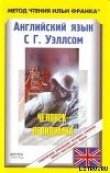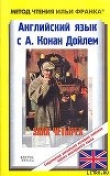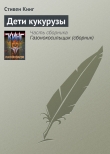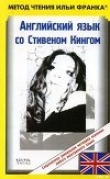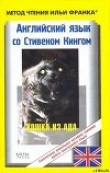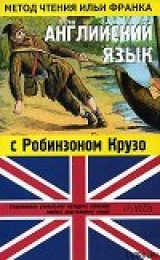
Текст книги "Английский язык с Робинзоном Крузо (в пересказе для детей)"
Автор книги: Илья Франк
Соавторы: James Baldwin
Жанры:
Языкознание
,сообщить о нарушении
Текущая страница: 3 (всего у книги 21 страниц) [доступный отрывок для чтения: 8 страниц]
I VISIT THE WRECK
(я посещаю разбитое судно)
WHEN I awoke (когда я проснулся; to awake – просыпаться) it was broad daylight (было совсем светло; broad – широкий; daylight – дневной свет; дневное время суток). The sun was up (солнце светило: «было наверху»). The sky was clear (небо было ясным). The air seemed soft and mild (воздух казался мягким и тихим; mild – безветренный, тихий, спокойный, ясный). A fine day was beginning (начинался прекрасный день).

It did not take me long (это не заняло у меня много времени) to come down from my lodging place (спуститься с моего места расположения; to lodge – располагаться).
I looked out toward the sea (я взглянул на море; toward – по направлению).
To my great wonder (к моему большому удивлению), I saw that the ship was now much closer to the shore (я увидел, что корабль был теперь намного ближе к берегу). The high tide had lifted her off the sand (высокий прилив приподнял его с песка). It had carried her toward the land (он отнес его к земле) and left her on a huge rock (и оставил на огромном рифе; rock – скала, утес; подводный камень, риф) less than a mile away (меньше чем в миле /о берега/).
I could see that the good ship stood upright (я мог видеть, что /мой/ добрый корабль стоял прямо/вертикально) and was firmly wedged into the rock (и был крепко насажен на риф; wedge – клин; to wedge – втискивать, загонять).
The waves had not broken her up (волны не сломали его), but her masts had been snapped off (но его мачты были отломаны; to snap off – отломать /резко/; to snap – щелкать, лязгать, хлопать; порвать, сломать), and all her rigging was gone (и все снасти исчезли).
The sea was quite smooth (море было довольно ровным; smooth – гладкий), and the tide was still going out (и все еще был отлив: «поток все еще выходил»). Soon the beach was bare (вскоре берег стал открыт: «обнажен»), and I could walk a long way out (и я смог пройти далеко /к морю/).
I was now within a quarter of a mile of the ship (я был теперь на расстоянии четверти мили от корабля; within – в, внутри; в пределах).
As I looked at her, a sad thought came to my mind (когда я посмотрел на нее, грустная мысль пришла мне на ум). For if we had all kept on board when she stuck in the sand (так как если бы мы остались на борту, когда он застрял в песке), we would now have been safe (мы бы сейчас были невредимы).
But there was no use (не было пользы = толку) in thinking of what might have been (обдумывать то, что могло бы быть).
I waded out (я пошел вброд; to wade – переходить вброд) as far as I could (настолько далеко, насколько смог), and then swam for the ship (а затем поплыл к кораблю; to swim – плыть).
As I came near her (когда я приблизился к нему), I saw that she was lying high out of the water (я увидел, что он лежал высоко из воды = возвышался над водой). The part of the rock that was uncovered (та часть рифа, которая была открыта: to cover – покрывать; to uncover —открывать) rose steep and straight into the air (поднималась круто и прямо в воздух). There was no place for me to set my feet (не было места, /куда/ поставить ноги).
I swam round the ship twice (я проплыл вокруг корабля дважды). How could I ever climb up her smooth sides (как я смогу когда-нибудь = как же мне взобраться по гладким сторонам/бокам)?
I was about to give up (я готов был сдаться), when I saw a small piece of rope (когда увидел небольшой кусок веревки) hanging down from the deck (свисающей с палубы). It reached almost to the water (он почти достигал = доставал до воды). How strange that I did not see it at first (как странно, что я не увидел его сначала)!
I seized hold of the rope (я ухватился: «схватил ухват» за веревку; to seize – хватать, схватывать; hold – схватывание, захват; сжатие; удержание), and climbed hand over hand to the deck (и проворно взобрался на палубу; hand over hand – быстро, проворно: «руку поверх руки»).
I went into the ship's cabin (я вошел в корабельную каюту). I looked all through the unlucky vessel (я осмотрел все несчастное судно; through – через; насквозь; от начала до конца).
awoke [ǝˈwǝuk], clear [ˈklɪǝ], air [ˈeǝ], mild [ˈmaɪld], toward [tǝˈwɔ:d], huge [hju:ʤ], upright [ˈʌpˈraɪt], bare [ˈbeǝ], quarter [ˈkwɔ:tǝ], use /сущ./ [ˈju:s], climb [ˈklaɪm], strange [ˈstreɪnʤ], seize [si:z], hold [ˈhǝuld]
I VISIT THE WRECK
WHEN I awoke it was broad daylight. The sun was up. The sky was clear. The air seemed soft and mild. A fine day was beginning. It did not take me long to come down from my lodging place.
I looked out toward the sea.
To my great wonder, I saw that the ship was now much closer to the shore. The high tide had lifted her off the sand. It had carried her toward the land and left her on a huge rock less than a mile away.
I could see that the good ship stood upright and was firmly wedged into the rock.
The waves had not broken her up, but her masts had been snapped off, and all her rigging was gone.
The sea was quite smooth, and the tide was still going out. Soon the beach was bare, and I could walk a long way out.
I was now within a quarter of a mile of the ship.
As I looked at her, a sad thought came to my mind. For if we had all kept on board when she stuck in the sand, we would now have been safe.
But there was no use in thinking of what might have been.
I waded out as far as I could, and then swam for the ship.
As I came near her, I saw that she was lying high out of the water. The part of the rock that was uncovered rose steep and straight into the air. There was no place for me to set my feet.
I swam round the ship twice. How could I ever climb up her smooth sides?
I was about to give up, when I saw a small piece of rope hanging down from the deck. It reached almost to the water. How strange that I did not see it at first!
I seized hold of the rope, and climbed hand over hand to the deck.
I went into the ship's cabin. I looked all through the unlucky vessel.
I MAKE ME A RAFT
(я делаю себе плот)
THERE was a great deal of water in the ship's hold (было много воды внутри корабля; deal – некоторое количество; great deal of – много; hold – то, что вмещает и удерживает; гнездо, паз; крепежная деталь; вместилище, хранилище; to hold – держать). But the cabin and the storerooms were dry (но каюта и кладовые были сухими; store – запас, резерв; to store – хранить, сохранять).

The boxes of food had not been touched by the water (короба с едой не были затронуты водой).
I was very hungry (я был очень голоден), but I had no time to lose (но не имел времени терять = не мог терять время). So I filled my pockets with dry biscuits (так что я наполнил карманы сухим печеньем) and ate them as I went about (и ел их, пока ходил /по кораблю/; about – кругом; повсюду; взад-вперед).
There were many things on the ship (на корабле было много вещей). They might be very useful to me (они могли бы быть полезными для меня) if I had them on shore (если бы я имел их на берегу). But there was no boat (но здесь не было лодки), and how could I carry them there (и как я мог отвезти их туда)?
"I will make a raft (я сделаю плот)." I said to myself (сказал я себе).
There were several long pieces of timber on the deck (на палубе было несколько длинных кусков дерева = бревен; timber – лесоматериалы; строевой лес; древесина; деревянный брус, бревно; балка). I tied a rope to each of these (я привязал веревку к каждому из них) so that it would not float away (чтобы оно /бревно/ не уплыло). Then I dropped them (затем я скинул их), one by one (одно за другим), over the ship's side (за борт корабля).
After this I slid down my rope into the water (после этого я спустил мою веревку в воду; to slide – скользить; совать), and tied these timbers together (и связал эти бревна). They formed a framework (они образовали каркас; frame, framework – скелет, костяк, каркас, остов) that was strong (который был прочным) and would not sink (и не потонул бы).
On top of this framework I laid all the boards I could find (поверх каркаса я положил все доски, которые смог найти; top – верхушка, вершина).
I now had a very good raft (теперь у меня был очень хороший плот). It was large enough (он был достаточно большой) to carry a great many things (чтобы везти/нести очень много вещей). All the time I was building it (все время, пока я строил его) I was planning how to load it (я планировал, как нагрузить его).
In the cabin there were three strong boxes (в каюте было три тяжелые ящика), such as sailors use (такие, какими пользуются моряки). These I emptied (эти я опустошил). Then I carried them out and let them down upon my raft (затем я вынес их и спустил вниз на плот).
Of all the things on board (из всех вещей на борту), I would need food the most (мне больше всего будет необходима еда). So I filled the first chest (поэтому я наполнил первый ящик; chest – ящик; коробка, сундук; вместилище) with bread, rice, cheese, and a few pieces of meat (хлебом, рисом, сыром и несколькими кусками мяса).
I found also a small bag of grain (я также нашел маленький мешок зерна), of which I took good care (который я бережно забрал: «о котором взял хорошую заботу = хорошо позаботился»). It was barley (это был ячмень).
Then I began to look around for clothing (затем я начал искать одежду), and found enough to do for many a day (и нашел достаточно, чтобы хватило на много дней).
While I was getting these together (пока я собирал эти /вещи/) I happened to see the carpenter's chest (мне посчастливилось увидеть плотницкий ящик). It was full of tools (он был полон инструментов).
It was hard work to get it on the raft (это была тяжелая работа – доставить его на плот). I lifted and pulled (я поднимал и тянул/тащил). I pulled and lifted; and at last I had it alongside of the other boxes (и наконец я имел его рядом с другими ящиками = мне удалось доставить его туда же, где были и другие ящики). How tired I was (каким уставшим я был = как же я устал)!
store [stɔ:], touch [tʌtʃ], hungry [ˈhʌŋɡrɪ], pocket [ˈpɔkɪt], dry [ˈdraɪ], biscuit [ˈbɪskɪt], ate [ˈeɪt, et], raft [rɑ:ft], together [tǝˈɡeðǝ], use /глаг./ [ˈju:z], bread [bred], meat [mi:t], barley [ˈbɑ:lɪ], clothing [ˈklǝuðɪŋ], carpenter [ˈkɑ:p(ǝ)ntǝ], pull [pul]
I MAKE ME A RAFT
THERE was a great deal of water in the ship's hold. But the cabin and the storerooms were dry. The boxes of food had not been touched by the water.
I was very hungry, but I had no time to lose. So I filled my pockets with dry biscuits and ate them as I went about.
There were many things on the ship. They might be very useful to me if I had them on shore. But there was no boat, and how could I carry them there?
"I will make a raft." I said to myself.
There were several long pieces of timber on the deck. I tied a rope to each of these so that it would not float away. Then I dropped them, one by one, over the ship's side.
After this I slid down my rope into the water, and tied these timbers together. They formed a framework that was strong and would not sink.
On top of this framework I laid all the boards I could find.
I now had a very good raft. It was large enough to carry a great many things. All the time I was building it I was planning how to load it.
In the cabin there were three strong boxes, such as sailors use. These I emptied. Then I carried them out and let them down upon my raft.
Of all the things on board, I would need food the most. So I filled the first chest with bread, rice, cheese, and a few pieces of meat.
I found also a small bag of grain, of which I took good care. It was barley.
Then I began to look around for clothing, and found enough to do for many a day.
While I was getting these together I happened to see the carpenter's chest. It was full of tools.
It was hard work to get it on the raft. I lifted and pulled. I pulled and lifted; and at last I had it alongside of the other boxes. How tired I was!
I CARRY SOME THINGS ASHORE
(я приношу некоторый вещи на берег)
IT was now past noon (было уже время после полудня), and the tide was coming in (и прилив приближался). I could not stop to rest (я не мог остановиться отдохнуть).
"I have food, I have clothing, I have tools (у меня есть еда, у мнея есть одежда, у меня есть инструменты)," I said to myself (сказал я себе). "What do I need next (что мне нужно следующим = теперь/еще)?"

Then I thought of the wild animals (затем я подумал о диких животных) and wild men (и диких людях) that I might meet on the shore (которых я мог встретить на берегу). "How shall I protect myself from them (как я буду защищать себя от них)?" I said.
In the captain's room I found two good guns (в комнате капитана я нашел два хороших ружья) with a bag of shot and a powderhorn (с сумкой дроби и пороха; bag – мешок; сумка). There were also two old swords (там были также две старые шпаги), very rusty and dull (очень ржавые и тупые), and a pair of big pistols (и пара больших пистолетов).
By looking around (осмотревшись), I found also three small kegs of powder (я обнаружил также три маленьких бочонка пороха; keg – бочонок /емкостью до 10 галлонов[2]2
галлон – мера жидких и сыпучих тел; английский галлон = 4,54 л
[Закрыть]/; a powder keg – пороховой бочонок). Two of these were dry (два из них были сухими), but the other was wet (но другой был мокрым) and good for nothing (и ни на что не годился: «и хороший для ничего»).
It took more than an hour to get all these safely placed on my raft (заняло больше часа уложить все это в сохранности на мой плот; safely – в сохранности; безопасно; благополучно). I now had quite a heavy load (у меня теперь была довольно тяжелая поклажа), and I began to wonder (и я начал задаваться вопросом; to wonder – удивляться; интересоваться; размышлять) how I should take it to the shore (как я должен доставить это на берег).
I had no oars nor any sail for my raft (у меня не было ни весел, ни паруса для моего плота). But the water was smooth (но вода была гладкой), the tide was flowing in (и был прилив: «поток приливал»), and a gentle wind was blowing toward the land (и тихий ветер дул по направлению к суше).
I loosed the rope (я ослабил веревку) that held the raft to the ship (которая держала плот к кораблю = которой плот был привязан к кораблю), and soon began my little voyage (и скоро начал мое маленькое путешествие).
The tide was now so high (прилив был сейчас столь высоким) that the dry land was much farther away (что суша была намного дальше) than when I came out (чем когда я отправился: «вышел» к кораблю). But the raft floated smoothly along (но плот плыл ровно; to go along – двигаться вперед), and drew nearer and nearer to the shore (и приближался ближе и ближе к берегу; to draw – тащить; тянуть; подходить, приближаться).
Just as I thought myself safe (как только я подумал, что я в безопасности), I found that I was entering a strong current (я обнаружил, что вхожу в сильное течение) which carried me into a narrow bay (которое относит меня в узкий залив) far from my first landing place (вдалеке от моего первого места «приземления» = прибытия /на берег/).
There the raft stuck fast (там плот застрял; to stick – торчать; застревать; fast – крепко) on an ugly sand bar (на ужасной песчаной отмели; ugly – безобразный, уродливый; мерзкий; скверный), and was like to be tipped over (и был готов быть перевернутым = перевернуться).
But the tide was still rising (но прилив все поднимался). Soon the raft floated free (вскоре плот поплыл свободно) and glided slowly along again with the current (и снова медленно скользил по течению: «с течением»).
In a short time I found that I was being carried up (через короткое время я обнаружил, что меня несло: «я был несом») into a little river with high banks on each side (в маленькую речку с высокими берегами на каждой стороне).
With a piece of plank for an oar (с куском доски = с доской вместо весла; plank – толстая и широкая гладко оструганная доска, планка) I pushed the raft toward the shore on my right (я толкнул плот к берегу справа). The water was now so shallow (вода была теперь столь мелкой) that I could reach the bottom (что я мог достать до дна).
The raft floated slowly onward (плот медленно плыл вперед) until it reached a little cove (пока не достиг маленькой бухточки) into which I pushed it (в которую я втолкнул его). The water there was quite still (вода была там вполне тихой/неподвижной).
I looked around for a place to land (я осмотрелся, ища место, чтобы пристать к берегу). But the banks were steep (но берега были отвесными), and if I ran one end of my raft upon the shore (и если бы я наехал одним концом моего плота на берег), the other end might sink so low as to slide all my goods into the water (другой конец мог опуститься/погрузиться так низко, что /мог/ сбросить/уронить все мои товары в воду; to slide – скользить; совать; зд. сбросить, дать соскользнуть).
The best I could do was to wait (самое лучшее, что я мог сделать, это ждать) till the tide was at its highest (пока прилив не достигнет максимальной высоты: «был при своем наивысшем»). Then I might push a little farther inland (тогда я мог толкнуть немного дальше от моря; inland – вглубь страны/суши) where the bank was somewhat lower (где берег был несколько ниже).
This I did (это я сделал = так я и сделал).
The tide rose higher and higher (прилив поднимался /все/ выше и выше). At last, to my joy (наконец, к моей радости), the water reached the top of the bank (вода достигла вершины берега). It covered a level spot of ground beyond (она покрыла ровную/плоскую полосу земли за этой вершиной; level – уровень; плоский, ровный; spot – пятнышко; крапинка; небольшой участок местности; beyond – за, по ту сторону).
I waited a little longer (я подождал немного дольше). The water on the level space was a foot deep (вода на ровном месте была в фут глубиной). The tide was beginning to flow out (поток стал отступать: «вытекать» = начался отлив).
With all my might I pushed the raft into this shallow place (со всей своей силой я толкнул плот на мелкое место). The tide ebbed fast (поток отступил быстро). Soon the raft was left high and dry on the land (вскоре плот был оставлен высоко и сухим на земле).
It was easy now to unload the goods (теперь было легко разгрузить товар/добро) and carry them to a safe place (и отнести его в безопасное место).
past [pɑ:st], food [fu:d], wild [ˈwaɪld], animal [ˈænɪm(ǝ)l], might [ˈmaɪt], protect [prǝˈtekt], gun [ɡʌn], powder [ˈpaudǝ], sword [sɔ:d], pair [ˈpeǝ], pistol [pɪstl], oar [ɔ:], smooth [smu:ð], gentle [ʤentl], current [ˈkʌr(ǝ)nt], reach [ri:tʃ], push [puʃ], cove [kǝuv], beyond [bɪˈjɔnd], level [ˈlev(ǝ)l], shallow [ˈʃælǝu]
I CARRY SOME THINGS ASHORE
IT was now past noon, and the tide was coming in. I could not stop to rest.
"I have food, I have clothing, I have tools," I said to myself. "What do I need next?"
Then I thought of the wild animals and wild men that I might meet on the shore. "How shall I protect myself from them?" I said.
In the captain's room I found two good guns with a bag of shot and a powderhorn. There were also two old swords, very rusty and dull, and a pair of big pistols.
By looking around, I found also three small kegs of powder. Two of these were dry, but the other was wet and good for nothing.
It took more than an hour to get all these safely placed on my raft. I now had quite a heavy load, and I began to wonder how I should take it to the shore.
I had no oars nor any sail for my raft. But the water was smooth, the tide was flowing in, and a gentle wind was blowing toward the land.
I loosed the rope that held the raft to the ship, and soon began my little voyage.
The tide was now so high that the dry land was much farther away than when I came out. But the raft floated smoothly along, and drew nearer and nearer to the shore.
Just as I thought myself safe, I found that I was entering a strong current which carried me into a narrow bay far from my first landing place.
There the raft stuck fast on an ugly sand bar, and was like to be tipped over.
But the tide was still rising. Soon the raft floated free and glided slowly along again with the current.
In a short time I found that I was being carried up into a little river with high banks on each side.
With a piece of plank for an oar I pushed the raft toward the shore on my right. The water was now so shallow that I could reach the bottom.
The raft floated slowly onward until it reached a little cove into which I pushed it. The water there was quite still.
I looked around for a place to land. But the banks were steep, and if I ran one end of my raft upon the shore, the other end might sink so low as to slide all my goods into the water.
The best I could do was to wait till the tide was at its highest. Then I might push a little farther inland where the bank was somewhat lower.
This I did.
The tide rose higher and higher. At last, to my joy, the water reached the top of the bank. It covered a level spot of ground beyond.
I waited a little longer. The water on the level space was a foot deep. The tide was beginning to flow out.
With all my might I pushed the raft into this shallow place. The tide ebbed fast. Soon the raft was left high and dry on the land.
It was easy now to unload the goods and carry them to a safe place.

